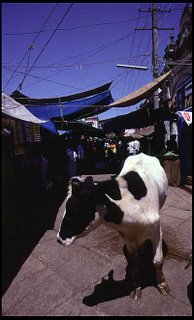
We have been giving our daughter organic milk for most of her life. Recently, we switched to a local dairy which offers home delivery. I noticed that the cartons contain a statement that it does not contain the artificial growth harmone rBST. It doesn't specifically say that it is "Organic". The organic dairy products sold in stores do contain the USDA stamp of approval that it is organic.
Hmm, does this mean that the milk we are drinking now contains rBGH or some other kind of harmone? What does the label 'organic' really mean? Do I care? Should I care? This sparked my interest and I started researching into this subject.
When I was a kid growing up in India, milk was delivered to every home by a village woman who used to milk her cows that morning. These cows were the ones which used to graze in our lawns. Their main job was to laze around grazing on lawns and gardens, and give milk, and occasionally deliver calves. In general, these were happy cows. Nobody used to harass them since cows are sacred, and they were free to roam the streets.
The only way to increase production (and make more money) was to water down the milk before delivering. Once this was discovered, the angry consumers demanded that the cows be milked in front of the individual customer's house. This made sure that there was no foul play and everyone was happy.
Those cows were fed natural greens and were healthy cows. They were never given any harmones, or subject to cruelty. Known as Kamadhenu, cows are worshipped by Hindus. So, this is what I think of, when I hear the word "organic".
Organic food products are those that are not subject to synthetic chemical inputs. In case of dairy products, it means that the cows are not given any synthetic chemicals, and the cows are not fed anything that is subject to synthetic chemicals. That is one mouthful. Using this definition, and my example above, organic could mean small farms, cows roaming never-ending green pastures, and cowherds singing and dancing around trees. Oops, that is in Bollywood movies.
But the reality is the cows end up spending most of their life in production lines, grazing out of troughs, and getting shots of all kinds of chemicals. Even in cases where they don't get exposed to synthetic chemicals, most live in inhumane conditions. I wonder how many products coming out of these factories are certified organic/natural. Reading about all these makes me want to go vegan.
Cows should have access to open air and natural pastures that are not subject to harmful pesticides. They should not be given any artificial harmones to increase their milk production. These cows are happy cows, and produce healthy milk, which in turn is good for human consumption.